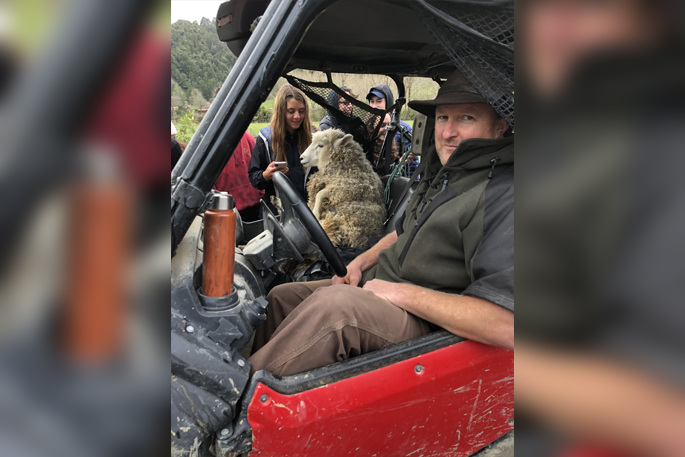Regenerating native species is at the heart of Blue Duck Station, a farm in the Central North Island covering 2800 hectares of beautiful-but-tough hill country terrain, surrounded by Whanganui National Park.
Many would consider the land too hard to farm, but owner Dan Steele says “it is just a matter of using the land for what it is best suited for”.
And ensuring that practices are sustainable, is what makes Blue Duck more like a conservation project than a farm.
In their efforts to reduce their environmental impacts, Dan is working with Avalon Genetics to breed a sheep that will require minimal chemical inputs.
“We are aiming to breed our ‘ultimate sheep’,” says Dan. “If they have a bare tail and belly that will mean no docking, and minimal dagging, dipping, or drenching will be required, which will be a lot less work for us and mean that the sheep will essentially be able to survive out on these steep and wild hills on their own.”
Dan and his team have also undertaken the massive task to reestablish wetlands around the farm and fence them off from stock.
“Establishing wetlands and planting natives around the waterways will help to naturally purify the water coming down off the hills and encourage native flora and fauna to regenerate in the area,” says Dan.
One native species that is flourishing at Blue Duck, is its namesake, the whio, or ‘blue duck’. The station is home to a healthy population of about 30 blue ducks.
“The blue duck is a great identifier of a healthy environment,” says Dan. “It needs the water quality to be really high, good rainforest surrounding the stream to provide shade and insects for food, and it needs a predator-free environment.
“Anything wrong with your environment and the blue ducks can’t survive so we have to get it right.”
But protecting this species, and others, is a constant battle. Dan and his team work hard to trap predators that prey on native species using sustainable trapping and hunting practices with 400 certified humane traps and 1500 bait stations on-farm. Some of their offerings to tourists also include guided hunting trips to help keep land mammals at a sustainable level.
Visitors are a big part of the station. Along with honey – Blue Duck produced 49,000kg of high-grade manuka this year – tourism provides another opportunity for Dan to diversify and avoid the need for intensive stock farming.
The station’s undeniable beauty brings tourists from worldwide. The team at Blue Duck Station uses each opportunity to educate their visitors about endangered native NZ species, and the vital conservation work they do to protect them.
Dan has also gone into business with British chef Jack Cashmore to create an extremely unique fine dining experience on one of the farm’s highest ridges with views of surrounding protected bushland, and volcanoes, which also offers boutique accommodation.
Conservation is central to Blue Duck Station’s work and continues to dictate each decision they make.
“You can’t do conservation work for a while and then stop,” says Dan. “Otherwise the situation will go back to where it was within a couple of months. This is an ongoing project for us, so I can pass this land onto future generations with pride.”
For more information, see: https://blueduckstation.co.nz or
Find out more about Avalon Genetics – which helps farmers breed high performance, multi-disease resistant, low-input sheep with less chemical and labour inputs to improve profits – at: https://www.avalongenetics.co.nz



0 Comments
Leave a Comment